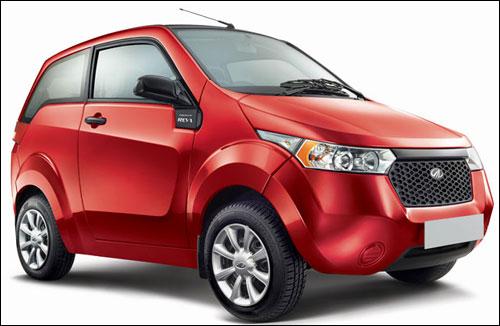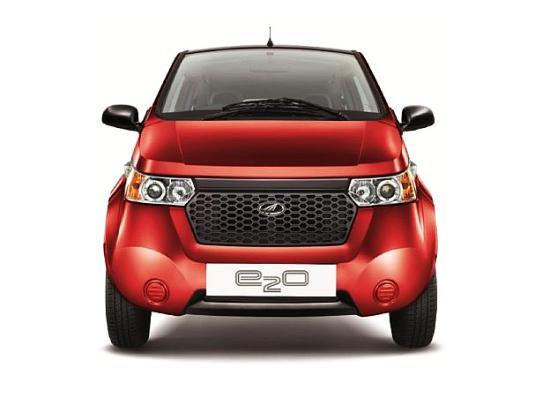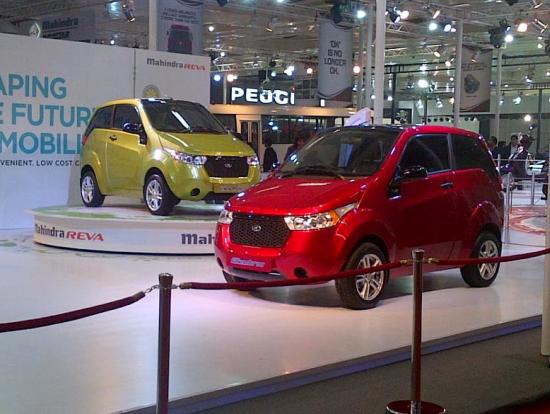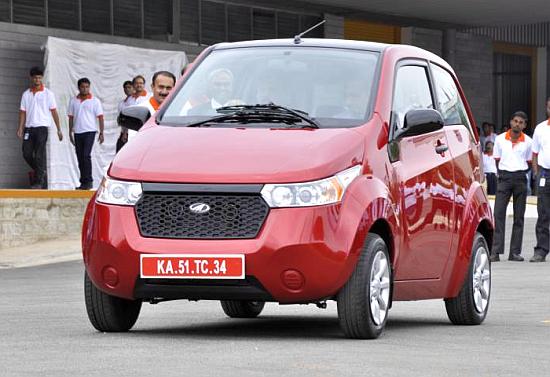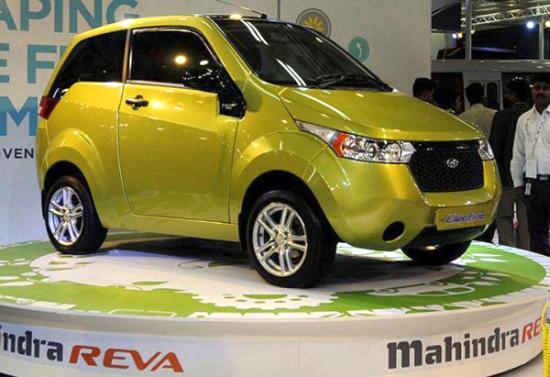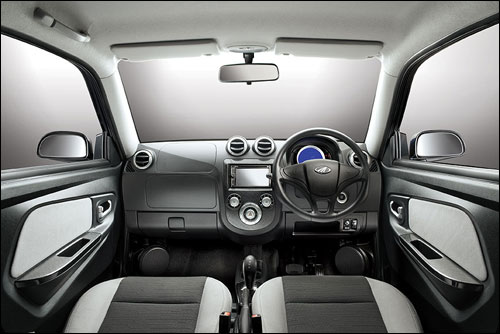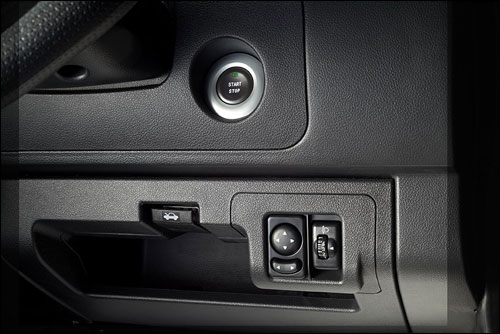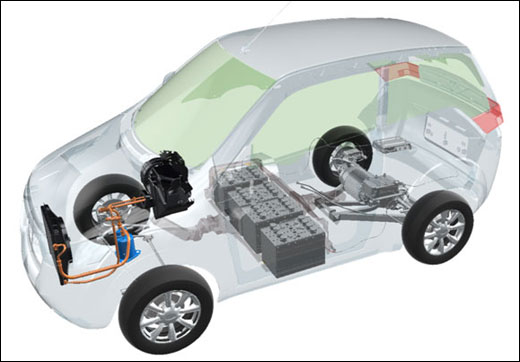 | « Back to article | Print this article |
Mahindra e2o: An electric car for the masses?
Say hello to the Mahindra Reva e2o.
Looks like a concept car, doesn't it?
Well, that's because the e2o started life as the Reva NXR concept and was designed by DC Design, which explains the unconventional, striking architecture.
With Maini Reva being bought over by Mahindra, the e2o became the latter's pet project on the electric car front.
The original Reva was, of course, severely hampered by its shrunken dimensions, both inside and out, and it wasn't very practical.
Or cheap.
Now, it is important to understand that unconventionally powered vehicles aren't exactly cheap to produce and even if you could find a way to do so, making them reliable and usable on a daily basis takes a lot of research and development.
Click NEXT to read further. . .
Mahindra e2o: An electric car for the masses?
As a result, the e2o isn't cheap, but it's a huge leap ahead from the original Reva. How? Well, read on!
It would be unfair to judge the e2o as a Rs 624,000 (on road, New Delhi) car.
It is expensive because of its niche powertrain and despite that, the interiors of the e2o are very impressive.
The layout is contemporary -- that giant speedometer dial behind the steering wheel looks swank -- and the numerous switches and stalks are rather decently built.
The dashboard plastic texture and build feels very good and the mildly flat-sided steering wheel gels well with the rest of the interior.
Click NEXT to read further. . .
Mahindra e2o: An electric car for the masses?
The large touchscreen interface mounted on the dash is the icing on the cake, considering it not only serves as a multimedia unit, but is also a functional GPS unit, which runs in sync with the car and helps you plan a route that is conducive to the available range before the e2o runs out of power, in an electric sense of the word.
You can also sync the interface to your smartphone via an application and turn the air-conditioning unit on and even lock/unlock your car.
However, the highlight of the interior package is the space on offer.
It is spacious enough for four adults and a few items of light luggage and even head room and shoulder room are very decent for a car that's only 3,280 mm long and 1,560 mm tall.
Click NEXT to read further. . .
Mahindra e2o: An electric car for the masses?
The air-con works well -- important, because the 'windows' at the rear don't actually roll down and nor are there vents at the rear.
Of course, the lack of rear doors won't go down too well with generously built people, but the front seat sliding mechanism is very convenient and well-designed.
Overall, the interior gets a thumbs up!
So, how different is it to drive as compared to a conventional car?
Well, the starting procedure is very different.
You press a button, hold the key fob -- which has an in-built sensor that activates the ignition -- close to the button and that's it, it's running.
It takes time getting used to this format because the 'engine' makes no noise, not even an indication, that it's been brought to life.
Click NEXT to read further. . .
Mahindra e2o: An electric car for the masses?
I selected 'F' (for 'forward') and got the car in motion.
Initially, driving this car feels very strange, even if you've driven a Reva before, because it's hard to make the association with a car that's nearly conventionally sized to move forth with no noise whatsoever.
Four gear modes -- F, B (for 'boost'), N (neutral) and R (reverse) -- are on offer, and on a full charge, which takes five hours, the e2o can cover a distance of 100 km according to what Mahindra Reva claims.
In real-world driving conditions, it would be fair to estimate that the range would drop down to between 85-90 km.
Still, there is a 'limp home' mode built into the system, which adds another 10 km to the e2o's range and a 'revive' function that gives it an additional 10 km of driving range.
Click NEXT to read further. . .
Mahindra e2o: An electric car for the masses?
Not bad, right?
Is it fun to drive?
Not in a very conventional sense, no.
If you select 'F' on the gear selector and step on the accelerator pedal, progress is mundane.
You can change that by selecting 'B'.
Then, it really comes alive and in not much time, the speedo gets up to 50 kmph rather quickly.
Mahindra Reva claims a top speed of 81 kmph for the e2o and while that claim doesn't seem too far fetched, the lack of engine noise at those speeds will definitely be unnerving for most.
Click NEXT to read further. . .
Mahindra e2o: An electric car for the masses?
A 3 phase induction motor powers the e2o and it produces 25.4 bhp@3750 rpm and 5.4 kg at, of course, 0 rpm.
The maintenance-free lithium-ion batteries come with a standard warranty of 3 years (or 60,000 km -- whichever is earlier) although the manufacturer suggests it can last as long as five years, depending on usage and driving pattern.
The service interval, too, is set 10,000 km apart (Mahindra's website suggests the cost of a regular service is Rs 1,500 to Rs 2,000, inclusive of labour and consumables), which sounds quite alright.
If charging it via electricity seems somehow inconvenient to you, you could even install the Sun2Car package, which charges the car using solar panels, depending, of course, on availability of sunlight.
Click NEXT to read further. . .
Mahindra e2o: An electric car for the masses?
The best part is, the e2o's motor benefits from regenerative braking and also idling consumes no power whatsoever.
So if you're stuck in a traffic jam of decent girth, you will spend power only on the occasions that you step on the accelerator.
Alright, for all its pep, the e2o isn't a car you can emulate Formula 1 drivers in.
Throw the car into corners aggressively and you will end up losing traction or generally upsetting the dynamics of the car.
Braking is good, thanks to the solid discs in the front and the drums at the rear, but the pedal modulation takes a lot of time getting used to.
The turning radius, at 3.9 m, is particularly small and this will, undoubtedly, come in very handy in urban driving conditions -- where the e2o really belongs.
Click NEXT to read further. . .
Mahindra e2o: An electric car for the masses?
Unfortunately, the e2o does not come with power-assisted steering and, because of the chunky rubber, steering the car around at low speeds does demand a bit of effort.
That said, the ride quality of the e2o is pretty decent.
The McPherson strut up front (with gas-filled shock absorbers for each wheel) works quite well and complementing this are the rather generously specced 155/70 R13 tubeless tyres.
It certainly isn't built for long hauls, but on the least intimidating of road conditions, the e2o maintains its composure quite well.
What is also to credit for this is its 830 kg kerb weight, which adds a sense of stability.
Then again, the usage of ABS panels for the bodywork all-round must have been essential, but feels typically flimsy in places and the panel gaps could have been attended to better.
Click NEXT to read further. . .
Mahindra e2o: An electric car for the masses?
VERDICT
Does buying an electric car really make sense?
Solely from a commuting perspective, which is where problems like economy, congestion and emissions largely exist, yes.
However, in the context of pure value, for roughly Rs 600,000 you can get your hands on a variety of hatchbacks, some sedans, an MPV and even an off-roader.
So should you consider the e2o as a worthy replacement to conventional cars?
Well, not exactly, and not just yet.
But for those of you with a specific driving cycle, looking at ease of commuting without spending atrocious amounts on fuel, the e2o makes absolute sense.
On the other hand, with a basic platform as well-rounded as this, will it be too much to expect Mahindra to put in a conventional internal combustion engine, albeit a really small one, into this car?
Think about it.
